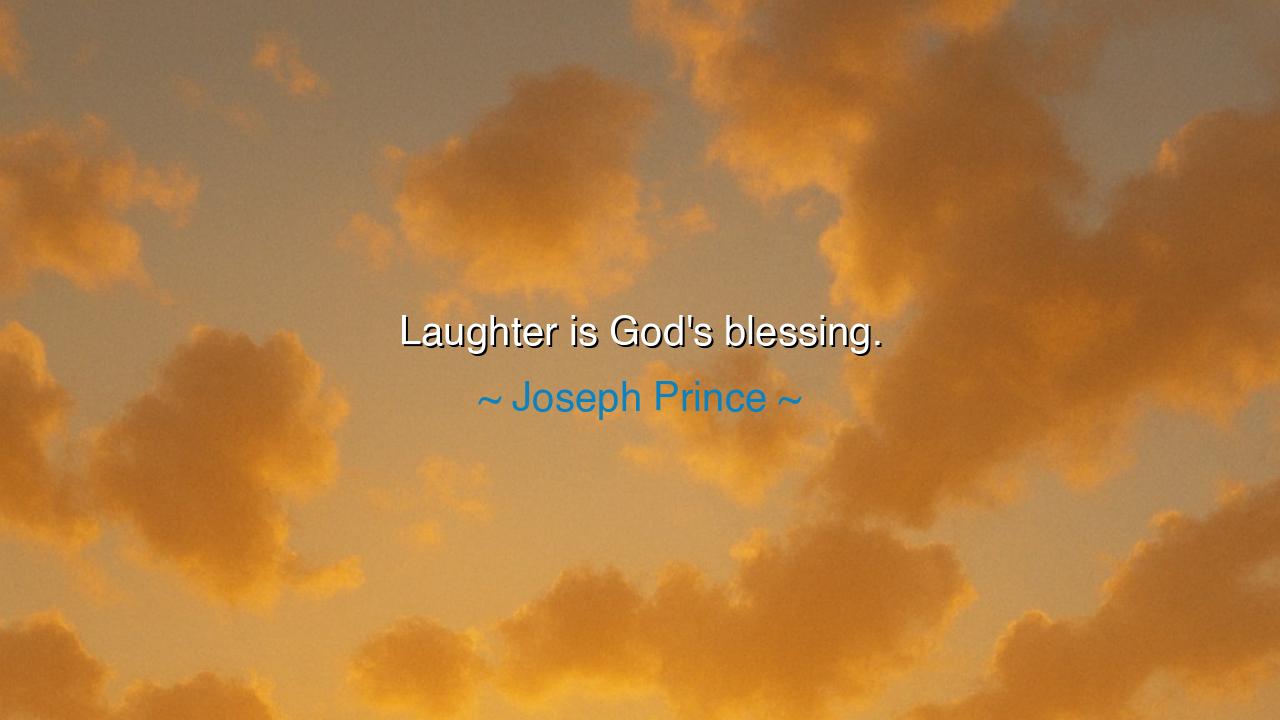
Laughter is God's blessing.






"Laughter is God’s blessing." — With these simple yet profound words, Joseph Prince captures a divine truth: that laughter, in all its forms, is not merely a human response to joy or humor, but a gift from the Divine, a blessing that flows directly from the heart of God. In a world filled with trials, suffering, and sorrow, laughter stands as a reminder of the joy and grace that the Creator has infused into the world. It is a moment of release, a chance for the soul to momentarily rise above its burdens and experience the lightness of being, a glimpse of the divine joy that awaits in the fullness of God’s kingdom.
In the ancient wisdom, laughter was often seen as a powerful force of healing and renewal. The ancient Greek philosophers, though they often viewed the human condition as fraught with suffering, recognized the value of laughter as a means of connecting with the joy of the divine. Aristotle, in his Nicomachean Ethics, spoke of humor as a sign of balance and virtue, suggesting that a life lived too seriously could lead to imbalance. For the ancients, to laugh was to embrace the full range of human experience — to acknowledge the light alongside the dark, and to remember that even in the depths of sorrow, there is grace to be found.
The sacred texts, too, speak of laughter as a reflection of God’s presence. The book of Psalms speaks often of joy and gladness as expressions of divine favor. Psalm 126:2 states, "Our mouths were filled with laughter, our tongues with songs of joy," celebrating the way that God’s blessings fill the soul with joy, causing the heart to laugh in gratitude and praise. Similarly, Sarah, the wife of Abraham, laughed when she was told she would bear a child in her old age. God, in His grace, blessed her with a son, and her laughter became a symbol of the impossibility made possible — a reminder that in the light of God’s favor, even the impossible can be filled with joy.
Consider the life of Nelson Mandela, whose spirit, despite suffering unimaginable injustice, found ways to laugh and bring joy to those around him. In his long years of imprisonment, Mandela found moments of humor that sustained his spirit. When he was finally released, he spoke of the healing power of laughter, which not only helped him survive the darkest days but also helped him lead a nation out of the shadows of apartheid. Mandela's ability to find laughter amid hardship was not just a reflection of personal strength but a manifestation of the divine blessing of joy in the midst of struggle. It was a sign that even in the deepest darkness, God’s grace can shine through, allowing the soul to rejoice.
Joseph Prince’s teaching about laughter reflects the profound truth that joy, when it comes from the heart, is not a fleeting emotion but a divine gift that nourishes and sustains. It is a blessing that comes not from external circumstances, but from the peace and grace that God instills within us. To laugh is to release the burdens we carry, to allow the heart to celebrate life, and to recognize that joy is a powerful force capable of transforming both body and soul. It is the soul’s recognition of God’s goodness and the beauty of creation, a divine reminder that we are not alone in our struggles, but that God’s presence fills the world with light and love.
The lesson in Joseph Prince’s words is simple, yet profound: laughter is not just a human reaction, but a divine blessing that elevates the soul, heals the heart, and connects us to the joy of God. It teaches us to embrace the full range of life — the sorrow and the joy — and to recognize that both are gifts from the Divine. When we allow ourselves to laugh, we acknowledge that God's grace can transform even the most difficult moments into opportunities for joy and growth. We open ourselves to the light that God offers and align ourselves with His divine will.
In our own lives, we must seek to cultivate moments of laughter and joy. Whether through humor shared with friends, the beauty of a sunset, or the unexpected moments of lightness that arise in the midst of struggle, we are invited to see laughter as a form of gratitude for the divine blessing of life. Laughter is a call to remember that, despite the challenges we face, we are loved and cared for by God, who fills our hearts with joy. Let us laugh not just in moments of ease, but in moments of trial, knowing that God's presence is with us, offering us the blessing of joy even in the darkest times. In embracing laughter, we embrace the gift of the Divine — a reminder that even in the seriousness of life, there is always a space for the healing power of joy.






AAdministratorAdministrator
Welcome, honored guests. Please leave a comment, we will respond soon